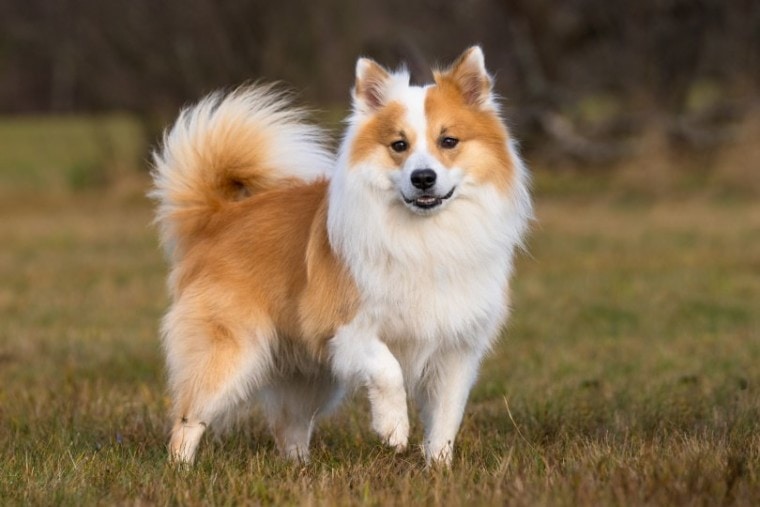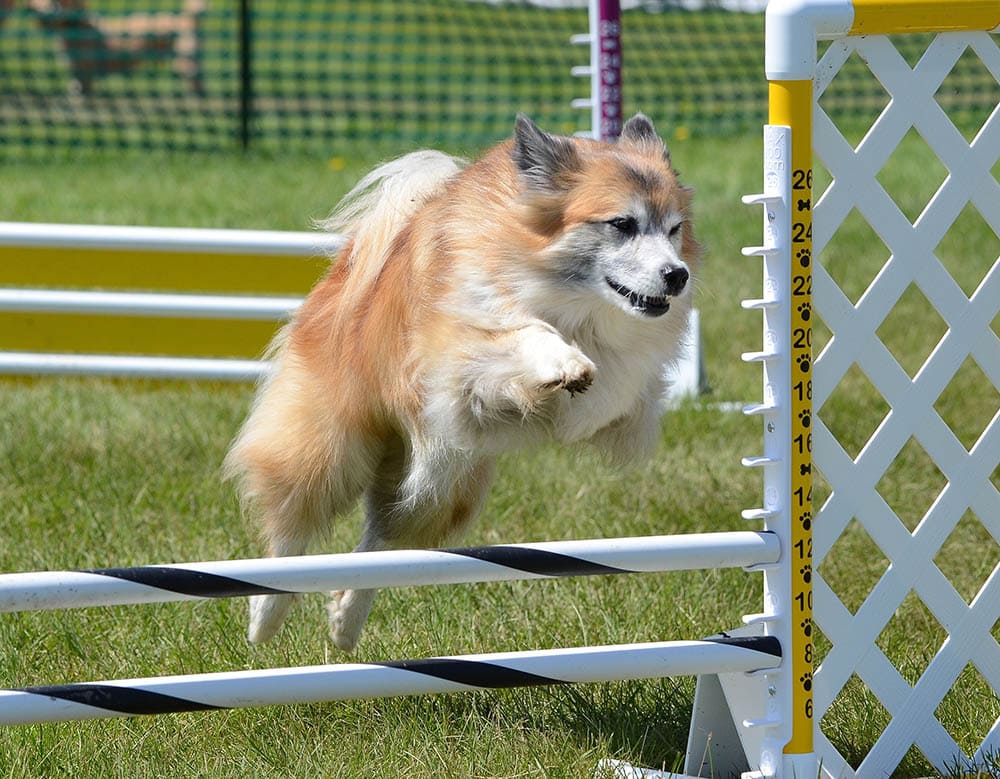
Click Below to Skip Ahead
The Icelandic Sheepdog is a friendly, happy pup, judging by the expression on its face. It is a part of a group of dogs known as spitzes. It includes other familiar breeds, such as the Samoyed and Chow Chow. As you may expect, all are cold-tolerant since they originated in northern climates where winters are often harsh.
Breed Overview
Height:
16.5–18 inches
Weight:
20–45 pounds
Lifespan:
12–15 years
Colors:
Black, chocolate, brown, reddish-brown, cream, gray, white
Suitable for:
Active families looking for an affectionate and playful dog
Temperament:
Loyal, alert, intelligent, kid-friendly
This breed’s history goes back to 900 A.D. to the time of the Vikings, making it one of the oldest in the world. The Icelandic Sheepdog is both a herding and guarding dog. It will round up livestock and keep them from wandering off the land while watching over its charges and owners. The pup is also intelligent and alert since its work demanded these traits.
The Icelandic Sheepdog is relatively new in the show circuit, earning recognition in 20101 by the American Kennel Club (AKC). The Leonberger and Cane Corso shared this honor the same year. It was the 166th breed of the organization. Today, it ranks number 154 in popularity. However, it’s sure to rise as more people get to know this lovable pooch.
Icelandic Sheepdog Characteristics
Icelandic Sheepdog Puppies
As you may surmise, a herding dog is an active one. The Icelandic Sheepdog is no exception. It takes a lot of energy to keep livestock under control. That translates into a pup that has high exercise needs and equal demands for mental stimulation. It’s a dog that must have a job to be happy. This breed is intense about what it does, whether it’s a game of fetch or playtime at the doggy park.
Temperament & Intelligence of the Icelandic Sheepdog
The Icelandic Sheepdog shares the intelligence that you’ll see in many working and herding dogs. Their job requires them to stay alert and respond quickly to changes. While some breeds are also independent, this pup is eager to please. It’s an affectionate dog that is loyal to its family. The Icelandic Sheepdog will also make sure you know about visitors to your home, with its watchdog abilities.
Are These Dogs Good for Families? 👪
The Icelandic Sheepdog makes an excellent family pet. It’s more likely to get the mental stimulation it craves in an active household. However, younger children or seniors may find the pup’s high energy and intensity a bit overwhelming. This pooch also wants companionship and won’t tolerate being alone for long stretches. That makes the breed an unwise choice for apartment dwellers who live alone.
Does This Breed Get Along with Other Pets?
The Icelandic Sheepdog isn’t a reserved dog. It can adapt to sharing a home with other pets, particularly if you socialize the pup early. The more people, animals, and situations you expose it to, the less fearful2 will it become. The breed has a moderately high prey drive that may make living with a cat or small animals more challenging. We suggest supervising time with other pets in your home.
Things to Know When Owning an Icelandic Sheepdog
Many herding breeds are vocal animals because their job demands it. It’s a good way to get some sheep or cattle moving. It brings that same trait to the family home. New pet owners will have to work with puppies from day one to keep this negative behavior in check. It’s one reason why the Icelandic Sheepdog probably isn’t the best choice for first-time dog owners.
Food & Diet Requirements 🦴
The essential thing to remember with all dogs is to feed a diet that is appropriate for their breed size and life stage. Your pet’s caloric and nutritional needs will vary as it grows. For example, a puppy needs about 22% protein in its diet, while an adult will do fine with 18%, according to the Association of American Feed Control Officials (AAFCO).
Puppies also need more frequent meals. You should plan on feeding little ones three to four times a day, depending on their age and activity level. Adult dogs will do well on two meals a day. We don’t recommend free-feeding your pet, which can increase its risk of obesity, despite how active the Icelandic Sheepdog is. Also, make sure that your pet has clean water available daily.
Exercise 🐕
Regular walks are an excellent way to ensure that your Icelandic Sheepdog gets enough exercise. It’ll also help reinforce its leash manners. We mentioned the pup’s prey drive. It also has a high wanderlust potential. Therefore, we don’t recommend letting your pet off-leash in an unfenced area. If an animal runs from it, your dog will likely follow.
Exercise is also a way to ensure your pet gets enough mental stimulation. As a herding breed, it’s on the go frequently, staying alert to anything that is out of place. That’s essential for your pup’s mental health and particularly true for breeds that need a job.
Training 🎾
The intelligence of the Icelandic Sheepdog will make training easy, especially given how much the pup wants to please you. The key to success is frequent and consistent lessons. The breed is intense about what it does and will probably show the same enthusiasm for learning new things. Of course, treats can make the lessons stick even better.
The Icelandic Sheepdog is relatively sensitive to harsh words. That’s not unexpected in a pup that is also susceptible to separation anxiety. That makes positive reinforcement a more effective way to teach your pet new commands and tricks. An affectionate pooch like this one will also relish lots of praise.

Grooming ✂️
A thick double coat goes hand in hand with a Nordic breed like the Icelandic Sheepdog. The dog will shed its undercoat twice a year, although you’ll likely find some shedding occurs all the time. That makes frequent brushing a must-do. It’ll help prevent mats and tangles that can prove difficult to remove.
You should also check your pet’s ears frequently. Breeds with thick coats like this one are often susceptible to ear infections. You may need to pluck or trim the hair inside of its ears occasionally. Telltale signs of a problem are head shaking, pawing at its ears, and rubbing its head on the floor or furniture to scratch its itch.
You should also check your pup’s eyes for any excessive weeping or redness. Of course, toenail clipping is a part of the routine, too. That’s particularly true if your dog walks or runs on softer surfaces more often than pavement.
Health and Conditions 🏥
The Icelandic Sheepdog is a healthy, robust breed with few health problems. A reputable breeder will screen their breeding stock for potential issues. We also strongly urge you to ask about a health guarantee. Again, a responsible seller will offer this peace of mind to all their buyers. The following health conditions
Male vs Female
Male and female Icelandic Sheepdogs look noticeably different, primarily because of the size difference. However, the temperament of both sexes is gentle and sweet, making either one an excellent choice for a pet. The main difference is the cost of altering your pet’s sex if you choose to go this route. Neutering a male is considerably less expensive and invasive than spaying a female.
However, there are health risks on both sides of the issue. There’s a chance that the procedure can cause complications. Likewise, it may affect your dog’s susceptibility to some medical conditions. There’s also a risk of obesity in altered pets. We suggest you discuss the matter with your veterinarian to make an informed choice.
3 Little-Known Facts About the Icelandic Sheepdog
1. Its Name Says It All
The Icelandic Sheepdog is the only native breed from its namesake country.
2. The Icelandic Sheepdog Almost Became Extinct
The AKC may classify the Icelandic Sheepdog as a herding dog, but it’s all about farm work. When agriculture declined in the country, so too, did the breed’s population, bringing it close to extinction.
3. The Aristocracy Had a Special Place for the Icelandic Sheepdog
The Icelandic Sheepdog was a favorite of the British nobility in the 14th–16th centuries. The breed even made an appearance in William Shakespeare’s play, “Henry V.”

Final Thoughts
If you can say one thing about the Icelandic Sheepdog, it is that it’s a survivor. Thanks to the support of enthusiasts and breeders worldwide, this pup has made an amazing comeback from the brink of extinction. As you’ve seen, this dog makes the world a better place with its sweet disposition and affectionate nature. You’ll likely find that inviting one into your home will bring joy to your family.
Featured Image Credit: Bildagentur Zoonar GmbH, Shutterstock






